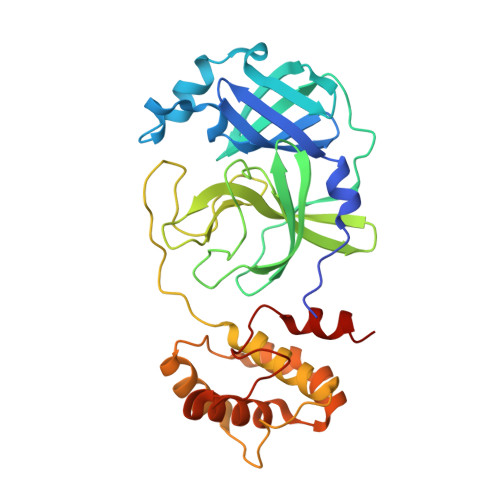3C-like protease inhibitors block coronavirus replication in vitro and improve survival in MERS-CoV-infected mice.
Rathnayake, A.D., Zheng, J., Kim, Y., Perera, K.D., Mackin, S., Meyerholz, D.K., Kashipathy, M.M., Battaile, K.P., Lovell, S., Perlman, S., Groutas, W.C., Chang, K.O.(2020) Sci Transl Med 12
- PubMed: 32747425
- DOI: https://doi.org/10.1126/scitranslmed.abc5332
- Primary Citation of Related Structures:
6VGY, 6VGZ, 6VH0, 6VH1, 6VH2, 6VH3, 6W2A, 6XMK - PubMed Abstract:
Pathogenic coronaviruses are a major threat to global public health, as exemplified by severe acute respiratory syndrome coronavirus (SARS-CoV), Middle East respiratory syndrome coronavirus (MERS-CoV), and the newly emerged SARS-CoV-2, the causative agent of coronavirus disease 2019 (COVID-19). We describe herein the structure-guided optimization of a series of inhibitors of the coronavirus 3C-like protease (3CLpro), an enzyme essential for viral replication. The optimized compounds were effective against several human coronaviruses including MERS-CoV, SARS-CoV, and SARS-CoV-2 in an enzyme assay and in cell-based assays using Huh-7 and Vero E6 cell lines. Two selected compounds showed antiviral effects against SARS-CoV-2 in cultured primary human airway epithelial cells. In a mouse model of MERS-CoV infection, administration of a lead compound 1 day after virus infection increased survival from 0 to 100% and reduced lung viral titers and lung histopathology. These results suggest that this series of compounds has the potential to be developed further as antiviral drugs against human coronaviruses.
- Department of Chemistry, Wichita State University, Wichita, KS 67260, USA.
Organizational Affiliation:


















